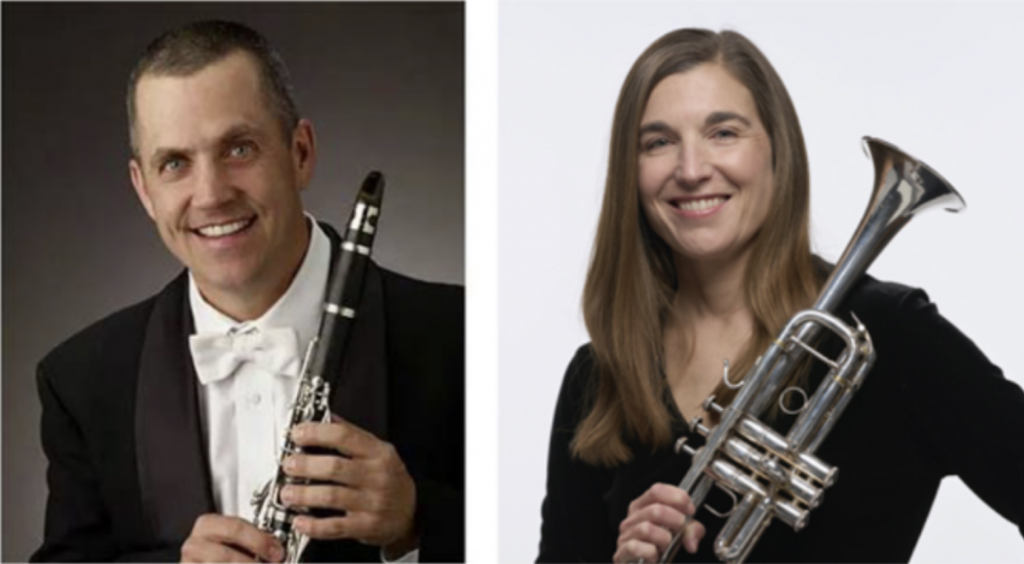by Jarrett Hoffman

To be fair, there isn’t a whole lot of music that could bring them together. But there is a pair of beloved pieces with unusual, colorful instrumentations, both by the same composer. “I don’t know which of us thought of it first, but there was an immediate idea of, ‘Wait a minute — Stravinsky,’” McKelway said during a recent interview.
They were thinking in particular of the Octet, which combines woodwinds and brass, and L’Histoire du Soldat (“Soldier’s Tale”), which brings together woodwinds, brass, strings, and percussion — plus narrator, telling the story of a soldier who strikes an ill-advised bargain with the devil.
Those two pieces and those two people — L’Histoire, the Octet, McKelway, and Bekeny — form the nucleus of the Rocky River Chamber Music Society’s season-ending concert, which will take place on Monday, May 15 at 7:30 pm at West Shore Unitarian Universalist Church. Attendance is free, and the concert will also be livestreamed.
The program could have stood as just that, given that Soldier’s Tale itself runs an hour long, but McKelway and Bekeny opted for a few more touches of Stravinsky. One piece that quickly came up is the Three Pieces for Solo Clarinet. “For clarinetists they’re very famous,” McKelway said, noting that they’re sometimes used in auditions. “They’re challenging in some ways, and they’re short and super fun.”
Then, looking through the catalog of Stravinsky chamber music, McKelway “bumped into these two quite odd duets” — Fanfare for a New Theatre for two trumpets, and Lied ohne Name (“Song without a Name”) for two bassoons. “I think they give a window into some of the quirky ways in which Stravinsky thought about composing and music — and events.” Fanfare was written for the opening of what was then known as the New York State Theater, now the David H. Koch Theater. “During Stravinsky’s life of course he was very famous, so he would get asked to write something for events, sort of like Mozart — ‘We need something for this event, Igor.’”
Of course, that adds up to an all-Stravinsky evening — something that’s not terribly common, as McKelway pointed out. And so, even though this music is no longer contemporary, and even though it’s written by one of the greats, the clarinetist likes that it will have “a very new feel for a lot of our audience.”
Building the program was only part of it. There was also building the group — and the two collaborators settled on a very deliberate way to go about doing that. With McKelway a member of The Cleveland Orchestra, and Bekeny a prominent member of the freelance and educational community, they decided to maintain a blend of those two worlds. “It became very natural to say, let’s keep a mix going.”
The group they gathered includes flutist Jessica Sindell, bassoonists Barrick Stees and Thomas English, trumpeter Ted Clark, trombonists Richard Stout and J.c. Sherman, percussionist Luke Rinderknecht, bassist Henry Peyrebrune, conductor Andrew Grams, narrator Brendan Caldwell, and someone McKelway said would be his “hero violinist,” if he had one — Peter Otto. “I want to play anything that Peter’s willing to play with me,” he said. “And L’Histoire has such a huge, fantastically evocative violin part.”
One notable feature of that list of performers is that it includes a conductor — something that can make quite a difference in L’Histoire.
“I think it helps for two reasons,” McKelway said. “One is that in large chamber music groups, it can be time-consuming to work through lots of ideas and inspirations about how a piece should be portrayed. So at some point somebody has to lead musically. It can be very natural for the violinist to do it, but it’s a lot of responsibility. A conductor really helps with deciding, ‘This is what this means, and this is what we want to convey to the audience.’”
The other reason is “pure nuts and bolts,” McKelway said. “In terms of putting things together, a conductor for a group like this reduces the amount of required rehearsal time.” (L’Histoire is known to be quite challenging to line up rhythmically.) “And when Andy Grams agreed to do it, we thought, awesome, because now we’ve got somebody we believe in.”
McKelway also noted the presence of another conductor on the program: Brendan Caldwell, who will take up the part of the narrator. “He’s the wind ensemble director at Baldwin Wallace, and to have a musician of his caliber narrating is great because you don’t have to worry about the timing of any of the entrances or exits. And Brendan’s a big personality — he’s going to bring a lot to that role.”
To close our conversation, I asked McKelway why he thinks people gravitate towards L’Histoire. Is it the music? The story? The combination thereof?
“For me personally, it’s the music, because I hear music that doesn’t have words as still telling stories. And in the music that I love, it’s easiest for me to find stories in the notes and the phrases. For the general audience, I bet it’s all of it: it’s by Stravinsky, it’s got a cool name, a really interesting instrumentation, and really interesting colors. And then for audiences that don’t know it but get excited about coming to hear it, I think it’s the promise of a story. The promise of something interesting. ‘Soldier’s Tale — what will that be about?’”
Published on ClevelandClassical.com May 10, 2023.
Click here for a printable copy of this article


